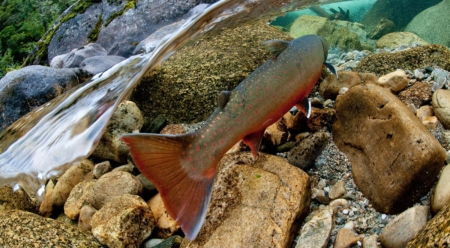A Fisherman Reflects on Global Warming
I’m not a scientist. But I am a fisherman of more than 70 years, and I’ve seen firsthand that of the myriad threats facing cold-water fish all over the world, global warming is the most dire.
Water all over the planet is heating up in response to climate change, and our cold-water fish are in serious trouble.
The temperature of the earth 50 feet down hovers around 56 degrees Fahrenheit. (That’s also the temperature of freshwater springs and the perfect temperature for your wine cellar, by the way). Cold-water fish need cold water. Trout and salmon thrive in water somewhere around 56 degrees. In water warmer than 68 degrees, all salmonids experience signs of stress, and warmer than 75 degrees is lethal.
In 2007, Yellowstone National Park experienced a huge fish kill when water temperatures in the Yellowstone River and many of its tributaries reached into the 80s. The same year in June, I was salmon fishing in Arctic Russia when air temperatures hit the 90s for several days. The rivers there are short and come out of shallow lakes, and after a few days the Rynda River heated up to the low 70s in the afternoon. I hooked and released a 12-pound salmon, but it stayed alongside my leg gasping for air for half an hour before it slowly swam away. A few years later in 2015, the mortality rate for sockeye salmon in the warmed-up Columbia River in the Pacific Northwest was between 80 and 90 percent: 250,000 salmon died before they could spawn. In August 2016, 350 miles of the Yellowstone River and its tributaries were closed to boating, fishing and swimming because of a parasite that caused kidney disease in whitefish and trout. Montana’s government website issued a report stating the “magnitude of the kill is unlike anything our fish health specialists have seen.” The parasite, combined with historically low stream flows and 70-degree waters, created a devastating scenario for fish populations, not to mention the local businesses that rely on the fishing economy.
In my home state of California, no Southern California steelhead has been able to spawn for the last five years because drought conditions had creeks so low they never broke through the sandbars. Hot conditions in Northern California have caused many lakes to be closed to all users because of lethal blue-green algae blooms. By lethal I mean, if your dog drank the lake water, it could die.
The freshwater algae Didymosphenia geminata, also known as Didymo or “rock snot,” can take over rivers when the water warms. We used to think it was spread by anglers transporting it from one body of water to another. Now scientists believe that hotter temperatures trigger its growth and spread. I’ve experienced it on the normally crystal clear Bonaventure River in Quebec—it was so thick in places you could hardly wade through it. Didymo also encourages the spread of the tubificid worm that’s a host for whirling disease, which causes skeletal deformation and neurological damage in salmon and trout.
Rising temperatures also influence our oceans, of course. The oceans capture so much human-produced carbon dioxide that they’re acidifying, and many of the microorganisms that form the basis of the whole food chain can no longer make shells and skeletons because there’s not enough mineral content. Warm-water ocean fish like mackerel can now travel further north where they prey on salmon smalls.
Winters start later and end sooner. The pocket glaciers and permanent snowfields in the Coast Range of British Columbia serve as an essential source of cold water all summer long for cold-water fish there. In my lifetime, I’ve personally seen those glaciers shrink by 30 percent. In these shortened winters, precipitation often comes as rain rather than snow and runoff can happen at anytime, resulting in catastrophic flood events that can alter the course of rivers and destroy redds (the nests where spawning fish lay their eggs).
Global climate change is happening, and whether you believe it’s human-caused or a natural occurrence makes a big difference. If it’s a natural cycle, then sit back and relax because there’s nothing we can do about it. But if we are the cause of any of it, we’re also the solution. I’ve found that the cure for depression is action. What can we do? Protect what you love. Get involved with local organizations that take care of your stream. Don’t vote for dumbass climate-change-denying politicians. Go fishing, and take a kid with you.
This story first appeared in the Fall 2017 Patagonia Catalog.

